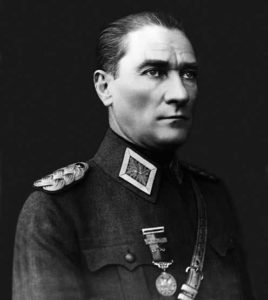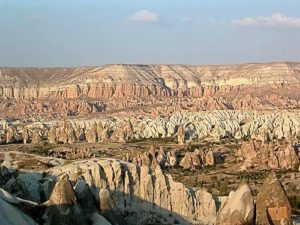Receive our newsletter
Your e-mail address is only used to send you our newsletter and information about the activities of Strasbourg Europe. You can always use the unsubscribe link included in the newsletter.
may
Picture: Hagia Sophia
Source: Turkish Embassy, Paris
 Born in Salonique in 1881, the future “father of the Turks,” Ataturk, claimed to be European. After a solid military education, Kemal participated in a movement against the sultan in 1908. During the First World War, Ataturk quickly became a national hero. In 1919 Kemal spearheaded a national revolt, which successfully overthrew the sultan; a provisionary government was later established in Ankara. In 1920, Mustafa Kemal was in complete opposition with the Treaty of Sevres, imposed by the Allied Powers, which dismantled the Ottoman Empire. Two year later in 1922, he fought against the Greeks, who attempted to seize Anatolia. Finally in 1923, the Treaty of Lausanne laid the foundation for a new state—the Republic of Turkey. National liberator, Mustafa Kemal became the founder and first president of the Republic. During his time as head of state, Ataturk transformed the nation into a secular and modern state, implementing legislation similar to the laws in Europe. Up to his death, the Republic was still somewhat authoritarian. Inspire by the French Revolution, Kemal favored national sovereignty, but refused to respond to the demands of the Kurds.
Born in Salonique in 1881, the future “father of the Turks,” Ataturk, claimed to be European. After a solid military education, Kemal participated in a movement against the sultan in 1908. During the First World War, Ataturk quickly became a national hero. In 1919 Kemal spearheaded a national revolt, which successfully overthrew the sultan; a provisionary government was later established in Ankara. In 1920, Mustafa Kemal was in complete opposition with the Treaty of Sevres, imposed by the Allied Powers, which dismantled the Ottoman Empire. Two year later in 1922, he fought against the Greeks, who attempted to seize Anatolia. Finally in 1923, the Treaty of Lausanne laid the foundation for a new state—the Republic of Turkey. National liberator, Mustafa Kemal became the founder and first president of the Republic. During his time as head of state, Ataturk transformed the nation into a secular and modern state, implementing legislation similar to the laws in Europe. Up to his death, the Republic was still somewhat authoritarian. Inspire by the French Revolution, Kemal favored national sovereignty, but refused to respond to the demands of the Kurds.
Picture: Atatürk
Source: Turkish Embassy, Paris
 The area is a famous and popular tourist destination, for its unique geological, historic and cultural features. The Cappadocia region is largely underlain by sedimentary rocks formed in lakes and streams, and ignimbrite deposits erupted from ancient volcanoes approximately 3 to 9 million years ago (late Miocene to Pliocene epochs). The rocks of Cappadocia near Göreme eroded into hundreds of spectacular pillars and minaret-like forms. The volcanic deposits are soft rocks that the people of the villages at the heart of the Cappadocia Region carved out to form houses, churches, monasteries. Göreme became a monastic center between 300-1200 AD. First period settlement in Göreme reaches to the Roman period from Christianity. Yusuf Koç, Ortahane, Durmus Kadir and Bezirhane churches in Göreme, houses and churches carved into rocks till to Uzundere, Bağıldere and Zemi Valley carries the mystical side of history today. The Göreme Open Air Museum is the most visited site of the monastic communities in Cappadocia and is one of the most famous sites in central Turkey. It is a complex comprising more than 30 rock-carved churches and chapels containing some superb frescoes, dating from the 9th to the 11th centuries.
The area is a famous and popular tourist destination, for its unique geological, historic and cultural features. The Cappadocia region is largely underlain by sedimentary rocks formed in lakes and streams, and ignimbrite deposits erupted from ancient volcanoes approximately 3 to 9 million years ago (late Miocene to Pliocene epochs). The rocks of Cappadocia near Göreme eroded into hundreds of spectacular pillars and minaret-like forms. The volcanic deposits are soft rocks that the people of the villages at the heart of the Cappadocia Region carved out to form houses, churches, monasteries. Göreme became a monastic center between 300-1200 AD. First period settlement in Göreme reaches to the Roman period from Christianity. Yusuf Koç, Ortahane, Durmus Kadir and Bezirhane churches in Göreme, houses and churches carved into rocks till to Uzundere, Bağıldere and Zemi Valley carries the mystical side of history today. The Göreme Open Air Museum is the most visited site of the monastic communities in Cappadocia and is one of the most famous sites in central Turkey. It is a complex comprising more than 30 rock-carved churches and chapels containing some superb frescoes, dating from the 9th to the 11th centuries.
Picture: Cappadocia region near by Nevsehir
Source: Turkish Embassy, Paris
A famous insult
The Tulip
The tulip, which gets its name from its form which resembles that of a turban can be found growing wild throughout Turkey.
Source: Turkish Embassy, Paris
Your e-mail address is only used to send you our newsletter and information about the activities of Strasbourg Europe. You can always use the unsubscribe link included in the newsletter.
Information Center
on the European Institutions (CIIE)
Europe Direct Information Center
All rights reserved to the CIIE
Non-profit organization
Mailing address
1 allée Kastner
67000 Strasbourg
France
Visitors entrance
8 rue Boecklin
67000 Strasbourg
France
To provide the best experiences, we use technologies such as cookies to store and/or access device information. Consenting to these technologies will allow us to process data such as browsing behavior or unique IDs on this site. Failure to consent or withdrawing consent may adversely affect certain features and functions.
Europe Direct network
The CIIE team
Contact information and opening hours
Lieu d’Europe
The CIIE offices
Contact us
CIIE’s Documentation Centre & Publications
School presentations & Activities
Borrowing of learning material
Activities for the general public
Institutions of the European Union in Strasbourg
Institutions Under the Authority of the Council of Europe
Other European Organisations in Strasbourg
Sessions of the European institutions in Strasbourg
Visiting the institutions
Map of the European district of Strasbourg
Institutions in Strasbourg in photos
Discover artistic Europe
National holidays of the member states of the Council of Europe